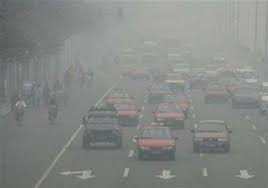Earth Day is a week from tomorrow. How many people will drive to their local environmental festival without even a second thought to how they got there?

The Amalgamated Transit Union and the Sierra Club will announce tomorrow that they are joining forces to highlight the connection between transportation and climate change.
Transit is important, "not only to people who ride it but also to everybody who breathes oxygen in the world," said ATU President Larry Hanley. That's why the union is strengthening its coordination with the Sierra Club.
“They completely get the importance of mass transit,” he said. “It’s just that we haven’t found ways to formalize our public relationship in the past. That’s what we’re going to do now.”
Transit advocates, including the ATU, have been working to advance the full range of arguments for transit with the Transit Is Greater campaign. The ATU’s new “Transit > Pollution” leaflet [PDF] is all ready to be rolled out at bus stops and train stations around the U.S. and Canada, where the union will be encouraging riders to become more active in the push for better transit. They’ll also be doing climate-themed events with the Sierra Club in May, and beyond that with events they're calling "Transit Tuesdays.
“We’re working with elected officials and candidates for public office to get out and ride transit with us, to organize riders to contact Congress for a better transit bill,” Hanley said, referring to the pending reauthorization of the MAP-21 transportation bill. They’re also planning a rally May 20 on Capitol Hill, after which members of the ATU and the Transport Workers Union will visit Congressional offices. Sierra Club locals and other community groups from around the country will support that event with phone calls to their representatives.
While initially timed around Earth Day, the partnership launch also coincides with a spike of interest in climate change following the release of a new report from the UN’s Intergovernmental Panel on Climate Change that issued a dire warning about the consequences of inaction. “Climate change, to those of us who don’t believe in voodoo but believe in science, is a real serious concern,” Hanley said. “We’re watching polar ice caps melt at the same time that our Congress has turned its back on the things that could slow that down -- like mass transit.”
Even many lawmakers concerned about environmental issues don’t pay enough attention to the power of transit to allay climate change, said Hanley. “That’s really the whole point of what we’re doing in May and throughout 2014,” he said. “We’re going to remind the ones who should know and alert the ones who don’t about the value of mass transit.”
According to the IPCC report, emissions from transportation could rise by 71 percent from 2010 levels by 2050, while the scientific consensus holds that the world needs to reduce overall greenhouse gas emissions 80 percent by then. The transportation sector is projected to be the fastest growing source of greenhouse gas emissions in the world.





